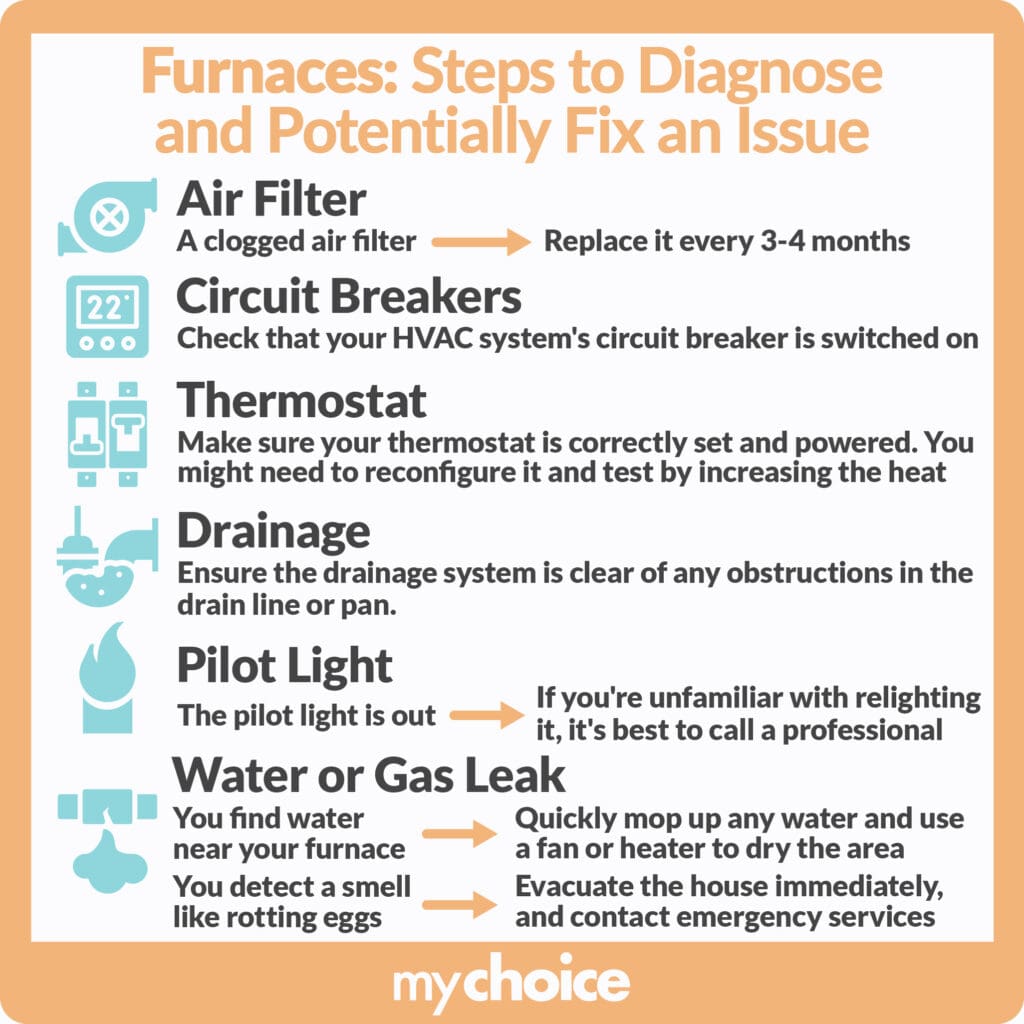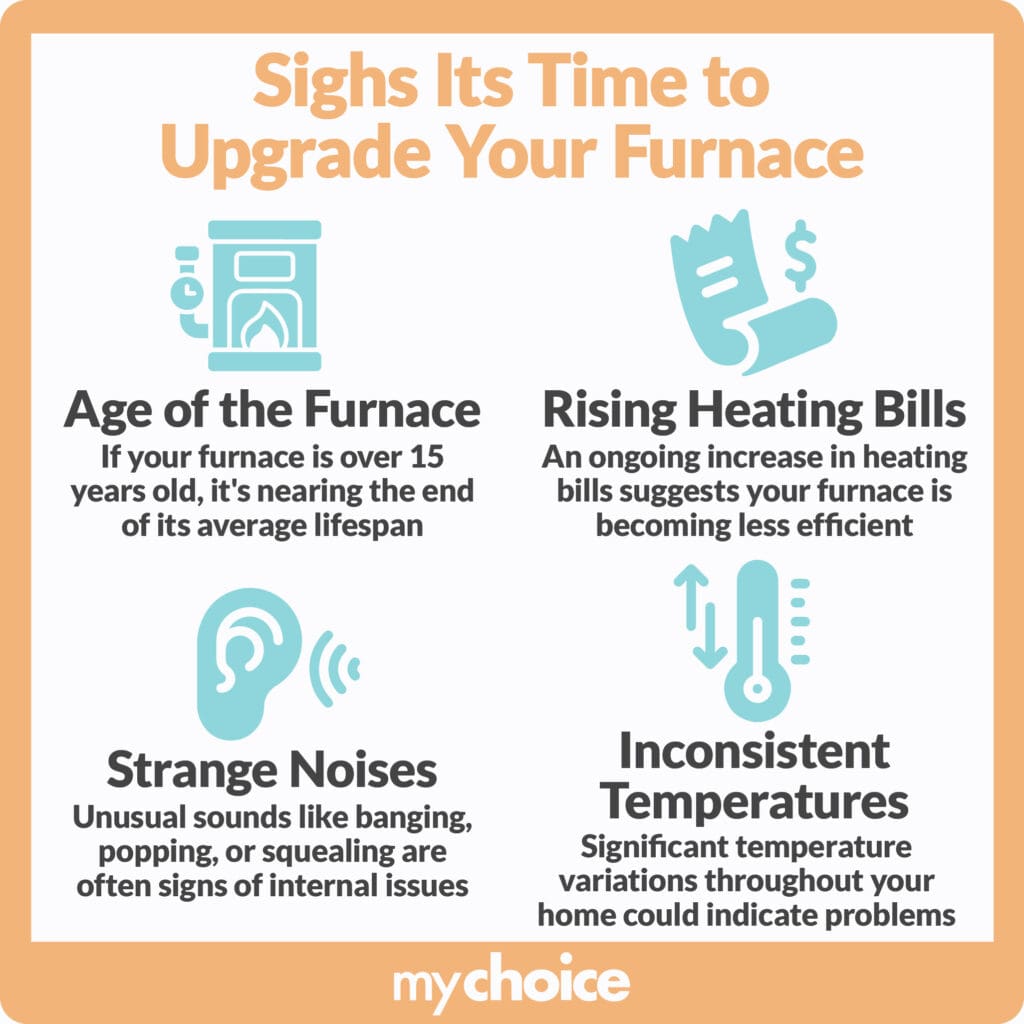Keeping your furnace in good condition can be difficult and expensive, especially as home insurance policies usually don’t cover wear and tear. That said, homeowners can ease the financial burden by maintaining their heating systems and taking advantage of a wide range of rebates.
Furnace & Home Insurance at a Glance
- Homeowners’ insurance doesn’t include furnace repair or maintenance, but it may cover damages to your heating system in the event of an insured peril.
- Regularly maintaining your furnace can help you save on costly repairs and replacements.
- Several federal, provincial, and municipal programs provide financial incentives and rebates for energy-efficient home heating systems.
Keep reading to learn more about when furnaces may be eligible for insurance claims, how to maintain your furnace and, if you want to upgrade your system, what incentives are available to you.
Are Furnaces Covered Under Homeowners Insurance?
Your insurance policy may pay for the cost of replacing or repairing your furnace if the cause of the damage is also covered. This could include fire, flood/water damage, and/or theft, depending on the terms of your insurance.
However, home insurance typically excludes maintenance and repairs due to wear and tear. Instead of furnace insurance, some manufacturers may offer a service warranty on rented furnaces ranging from $15-20/month.
Understanding Home Furnaces in Canada
More than half of Canadian homes are primarily heated by forced air furnaces, which use fans to blow heated air throughout the house. Furnaces can vary based on:
- Fuel type: Furnaces can be powered by oil, propane, electricity, or natural gas.
- Equipment cost: Furnace replacement can cost anywhere from $1,000 to $7,000. This usually includes the removal of your old system and the installation of your new one.
- Annual Fuel Utilization Efficiency (AFUE) rating: The AFUE rating tells you how much fuel is converted into heat versus how much is wasted. The higher the number, the more efficient the furnace.
- Operational costs: While natural gas is generally the most affordable fuel type, operational costs can significantly differ across provinces. For example, natural gas is an extremely common (and therefore cheap) heat source in Alberta and Ontario, while oil, wood, and electricity are popular in the Atlantic provinces (e.g., Nova Scotia, Prince Edward Island).
| Type of Furnace | Average Cost | Average AFUE | Operational Costs |
|---|---|---|---|
| Natural gas | $5,000 – $7,000 | 95-98% | Most affordable |
| Propane | $5,000 – $7,000 | 80-94% | Affordable |
| Oil | $3,000 | 80-90% | Most expensive |
| Electric | $1,000 – $3,000 | 100% | Expensive |
Diagnosing an Issue with Your Furnace
Pay attention to the aspects outlined in the below infographic when diagnosing an issue in your furnace.

Preventative Maintenance Tips for Furnaces
Regular maintenance can help you avoid costly repairs that aren’t covered by insurance. Below are some of our top tips for keeping your furnace in tip-top shape:
- Before you even consider replacing your furnace, make sure you check the thermostat, air filter, drain, circuit breaker, and pilot light. Most issues with these parts can be fixed on your own or by an HVAC professional.
- Use a smart thermostat to automatically adjust the temperature of your home according to your needs and preferences. For example, you can set a timer on the heat or turn it off completely when no one’s home.
- Every 3-4 months (less if you have allergies), change the air filter. This prevents dust and other debris from blocking the airflow.
- Make sure vents and ducts are free of obstructions, dust, and mould. Thoroughly clean and air them out at least once a year.
- Keep the area around your furnace clean and clear of debris. Store cleaning products, paint, and other chemicals far away from the air intakes.
- Listen for unusual or strange noises, such as scraping, slapping, grinding, banging, or screeching. These warn you of existing and potential problems.
- Address any water or gas leaks near your furnace ASAP. If you smell sulphur or rotting eggs, immediately evacuate and call a professional.
- If you use a natural gas furnace, test your carbon monoxide detectors regularly. Replace its batteries every six months.
- Schedule professional maintenance twice a year to catch issues before they snowball into something serious.
Why You Should Replace/Upgrade Your Furnace
If your furnace is more than 15 years old, requires frequent repairs, or heats your home inconsistently, it might be time to replace it. Homeowners who upgrade their heating systems benefit in many ways:
Incentives/rebates:
There are a variety of national and local programs that make it easier for homeowners to switch to more energy-efficient heating solutions.
Lower insurance premiums:
Premiums are priced based on the risk of insuring you. Some heating systems, especially older ones, are more prone to issues. As the likelihood of claims increases, so do your premiums.
Cheaper utilities:
A new furnace doesn’t have to work harder to heat your home, resulting in lower energy bills.
Eco-friendliness:
Modern furnaces with energy-saving features burn less fuel, produce less waste, and can even run on renewable energy sources like solar.
Increased home value:
New HVAC systems make your property much more desirable to potential buyers.
Comfort & safety:
At best, an old furnace will heat your home unevenly or cause some allergies. At worst, it could leave you vulnerable to gas leaks and fire. Replacing your heating system provides much more peace of mind.
When to Upgrade Your Furnace
The below infographic showcases the signs you need to pay attention to in order to determine if it’s time to replace your furnace.

Rebates and Incentives for Energy-Efficient Heating Systems
To encourage Canadians to transition to greener energy solutions, the government offers a wide range of incentives, tax credits, and rebates to homeowners who upgrade their furnaces.
National
Furnaces are not eligible for rebates under the Canada Greener Homes Initiative, except for homes in select off-grid/Northern areas. Its programs include:
| Incentive/Rebate | Amount | Notes |
| Canada Greener Homes Grant | Up to $5,000 for retrofits to $600 for evaluations | Closed to new applicants |
| Oil to Heat Pump Affordability Program (OHPA) | Up to $10,000 across Canada Additional $5,000 in eligible provinces | Means-tested (median or less income) |
| Canada Greener Homes Loan | $5,000 – $40,000 | Interest-free loans repayable up to 10 years |
Alberta
| Incentive/Rebate | Amount | Notes |
| Clean Energy Improvement Program (CEIP) | Up to 100% of project costs | Repayable up to 20 years through property tax bill |
| Banff Residential Rebates | $500 | Available for high-efficiency ENERGY STAR-certified furnaces |
British Columbia
| Incentive/Rebate | Amount | Notes |
| CleanBC Better Homes and Renovation Rebate Program | Up to $6,000 Variable top-ups per municipality | Rebates for natural gas furnaces no longer available |
| ENERGY STAR Tax Credits | Up to $600 or 30% of project cost | Available for ENERGY STAR-certified furnaces with AFUE > 97% |
Manitoba
Efficiency Manitoba provides financial assistance to help Manitobans afford energy-efficient upgrades. Its programs include:
| Incentive/Rebate | Amount | Notes |
| Energy Efficiency Assistance Program | $9.50/month to replace a standard efficiency furnace; $25/month to replace a mid-efficiency furnace | Available to homeowners and renters with limited income. Payable in five years |
| Metis Energy Efficiency program | Free upgrade to mid- or high efficiency furnace | Available to homeowners and tenants in Red River Metis |
Newfoundland and Labrador
| Incentive/Rebate | Amount | Notes |
| Oil to Electric Incentive Program | Up to $10,000 for electric furnaces | Varies based on income |
Nova Scotia
Ontario
| Incentive/Rebate | Amount | Notes |
| Home Efficiency Rebate Plus (HER+) | Up to $6,500 for space/water heating. Up to $600 for evaluations | Closed to new applicants |
| Clean Home Heating Initiative | Up to $4,500 | Closed to new applicants |
| Ontario Renovates Program | Up to $25,000 (varies by city/municipality) | Interest-free/forgivable loans for energy, safety, and accessibility upgrades |
| Home Energy Loan Program (HELP) | Up to $125,000 | Low/no-interest loans. Repayable up to 20 years |
| BetterHomes Ottawa Loan Program | Up to $125,000 or 10% of home value. Additional $2,000 for heat pump installation | Low-interest loans. Repayable up to 20 years |
Prince Edward Island
| Incentive/Rebate | Amount | Notes |
| Energy Efficient Equipment Rebates | Up to $3,500 | Varies based on furnace type and income qualification |
| Residential Home Heating Loan Program | Up to $30,000 | Interest-free loan. Repayable up to 10 years |
Quebec
| Incentive/Rebate | Amount | Notes |
| Chauffez vert program | Up to $1,275 | Varies based on the type of home and original fuel type |
Saskatchewan
| Incentive/Rebate | Amount | Notes |
| SaskEnergy Residential Rebates | Up to $650 | Varies based on AFUE |
| Home Renovation Tax Credit | Up to $2,100 | Available for eligible home renovation expenses |
Key Advice From MyChoice
Now that we’ve learned more about how furnaces affect your home insurance, here are some top tips to follow:
- Furnace repairs aren’t covered by most home insurance policies unless the damage is caused by an insured event, such as flood, fire, or robbery.
- You can prevent costly repairs by regularly checking on your furnace, investing in smart heating controls, and keeping both the heating system and the area/s around it clean.
- Replacing old units with modern high-efficiency models could reduce the costs of insurance and energy while improving property value, air quality, and safety.
- Homeowners can save money when they switch from traditional furnaces to more energy-saving solutions (e.g., heat pumps, electric furnaces, etc.), thanks to rebates and other financial incentives from the Canadian and local governments.








